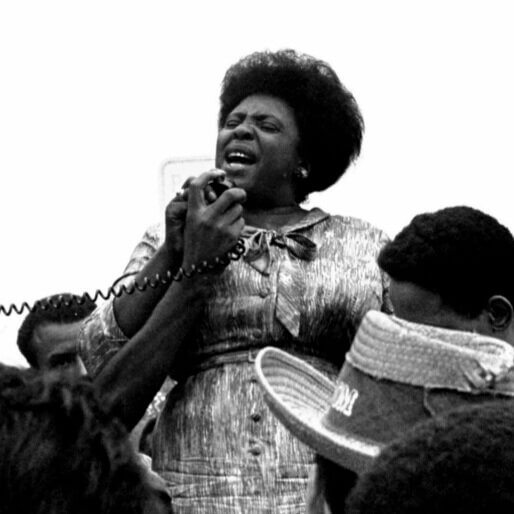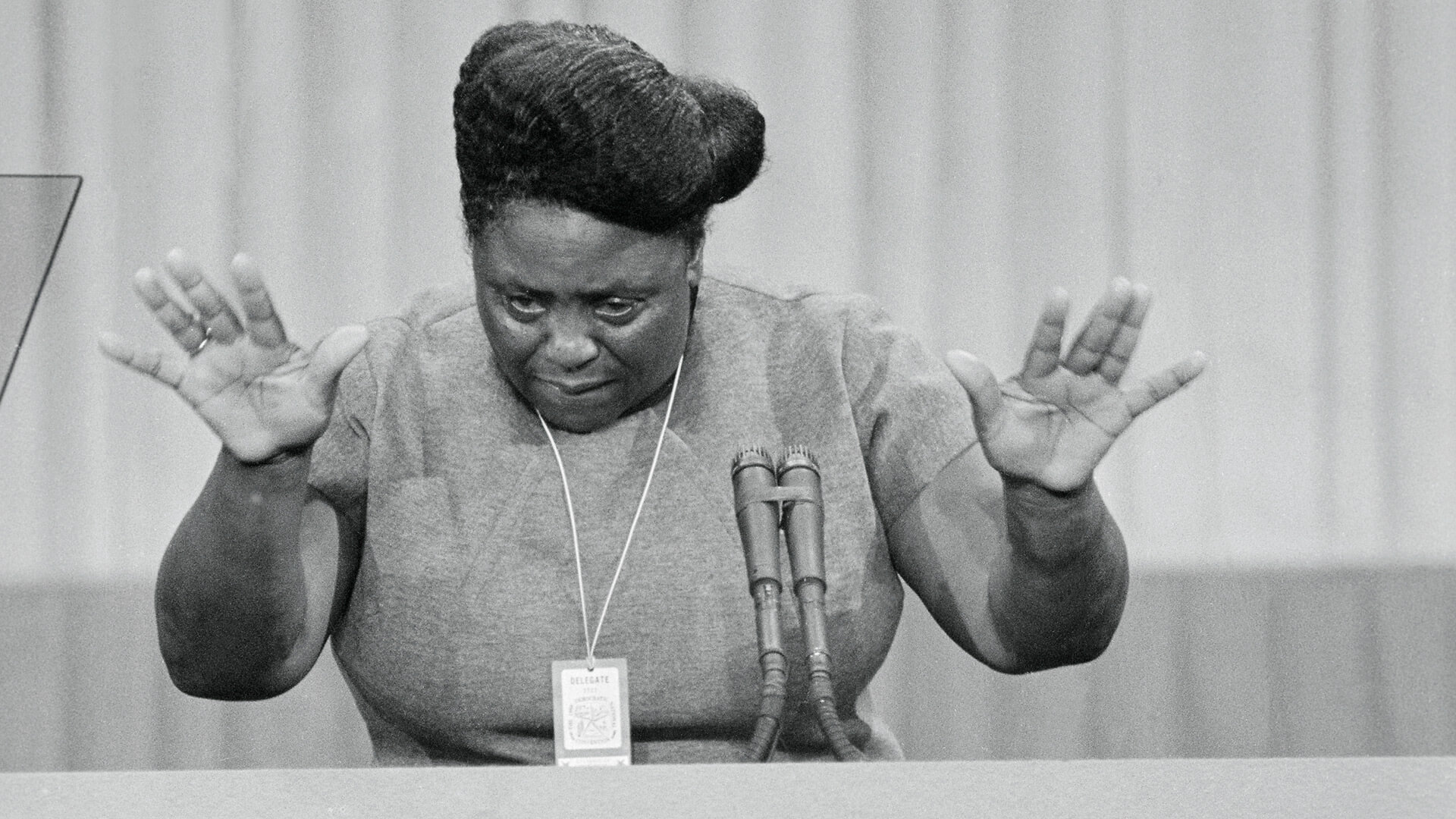Who was Fannie Lou Hamer? Information about the life and struggle of American human rights activist, equal rights activist for blacks Fannie Lou Hamer.
Fannie Lou Hamer (1917-1977) was an American civil rights activist and leader. She was born into a family of sharecroppers in Mississippi and worked on plantations from an early age. Hamer became involved in civil rights activism in the 1960s and became a key figure in the movement. She was a co-founder of the Mississippi Freedom Democratic Party, which challenged the all-white delegation from Mississippi at the 1964 Democratic National Convention. Hamer’s powerful testimony before the convention’s Credentials Committee brought national attention to the issue of voting rights for African Americans in the South. She continued to work for civil rights throughout the rest of her life, advocating for voting rights, desegregation, and economic justice. Hamer is remembered as a tireless and fearless advocate for social justice and equality.
Early Life
Fannie Lou Hamer was born on October 6, 1917, in Montgomery County, Mississippi. She was the youngest of 20 children born to sharecroppers Lou Ella and James Townsend. Hamer grew up in poverty and worked on a plantation from an early age. She was forced to drop out of school in the sixth grade to help her family with the cotton harvest. Despite the lack of formal education, Hamer was a gifted speaker and singer, and often led songs at church and community gatherings. In 1944, she married Perry “Pap” Hamer, another sharecropper, and the couple had two children together. The family continued to work as sharecroppers until the mid-1960s, when Hamer became involved in the civil rights movement.

Fannie Lou Hamer
Education
Fannie Lou Hamer had to drop out of school in the sixth grade to work on a plantation and help support her family. However, she was a lifelong learner and continued to educate herself throughout her life. Hamer attended citizenship schools, which were training programs designed to teach African Americans about their rights and how to exercise them. She also attended a program at the Southern Christian Leadership Conference, where she learned about nonviolent protest and civil disobedience. Despite her limited formal education, Hamer was a gifted speaker and a passionate advocate for education as a means of empowerment. She believed that education was the key to breaking the cycle of poverty and oppression that had trapped her and so many others in the rural South.
Civil Rights Activism
Fannie Lou Hamer became involved in civil rights activism in the early 1960s. In 1962, she attended a meeting of the Student Nonviolent Coordinating Committee (SNCC) and became involved in voter registration efforts in Mississippi. She was a co-founder of the Mississippi Freedom Democratic Party (MFDP), which was formed in 1964 to challenge the all-white delegation from Mississippi at the Democratic National Convention.
Hamer’s powerful testimony before the convention’s Credentials Committee brought national attention to the issue of voting rights for African Americans in the South. She described the brutal treatment she had suffered at the hands of white police officers and emphasized the need for change. Her words, “I’m sick and tired of being sick and tired,” became a rallying cry for the civil rights movement.
Hamer continued to work for civil rights throughout the rest of her life, advocating for voting rights, desegregation, and economic justice. She helped establish the National Women’s Political Caucus in 1971 and worked to encourage women, especially women of color, to get involved in politics. She also founded the Freedom Farm Cooperative, a community-based organization that helped poor people in Mississippi become self-sufficient through agriculture. Hamer is remembered as a tireless and fearless advocate for social justice and equality.
Freedom Farm Cooperative and later activism
In 1969, Fannie Lou Hamer established the Freedom Farm Cooperative, a community-based organization in Mississippi that helped poor people, especially African Americans, become self-sufficient through agriculture. The cooperative consisted of a 640-acre plot of land that was purchased with the help of donations and grants. Hamer believed that owning and working the land was key to achieving economic independence and breaking the cycle of poverty.
The Freedom Farm Cooperative provided land, equipment, and training to its members, many of whom were former sharecroppers and migrant workers. Members were encouraged to work together to grow crops, raise livestock, and build homes on the land. The cooperative also provided education and training in areas such as health and nutrition, community organizing, and cooperatives.
Hamer continued to work for civil rights and social justice throughout the 1970s. She helped establish the National Women’s Political Caucus in 1971 and worked to encourage women, especially women of color, to get involved in politics. In 1972, she ran for Congress as a candidate of the Mississippi Freedom Democratic Party, but was defeated by the incumbent. Hamer also advocated for the rights of Native Americans and for an end to the Vietnam War. She died on March 14, 1977, at the age of 59.

Fannie Lou Hamer
Later Life and Death
In the years leading up to her death, Fannie Lou Hamer continued to work tirelessly for civil rights and social justice. She spoke at rallies and conferences, and continued to advocate for voting rights, desegregation, and economic justice. She also founded the Freedom Farm Cooperative, which helped poor people, especially African Americans, become self-sufficient through agriculture.
Hamer’s health began to decline in the mid-1970s, and she was diagnosed with breast cancer. She underwent several surgeries and treatments, but her health continued to deteriorate. She died on March 14, 1977, at the age of 59, in a hospital in Mound Bayou, Mississippi. Her legacy as a tireless and fearless advocate for social justice and equality continues to inspire and influence people today.
Tributes
Fannie Lou Hamer is remembered and celebrated for her courage, resilience, and commitment to social justice. Her powerful testimony before the Credentials Committee of the 1964 Democratic National Convention brought national attention to the issue of voting rights for African Americans in the South. Her words, “I’m sick and tired of being sick and tired,” continue to inspire and resonate with people today.
Hamer has been honored with numerous awards and tributes. In 1978, the Fannie Lou Hamer National Institute on Citizenship and Democracy was established at Jackson State University in Mississippi. The institute works to promote social justice and civic engagement, and to honor the legacy of Fannie Lou Hamer. In 1993, Hamer was posthumously inducted into the National Women’s Hall of Fame. She has also been honored with a postage stamp, a street in her hometown of Ruleville, Mississippi, named after her, and various memorials and monuments.
Hamer’s life and work continue to inspire and influence people today, particularly in the areas of civil rights, social justice, and political activism. She is remembered as a powerful voice for the marginalized and oppressed, and as a symbol of courage, perseverance, and hope.
Pulsar